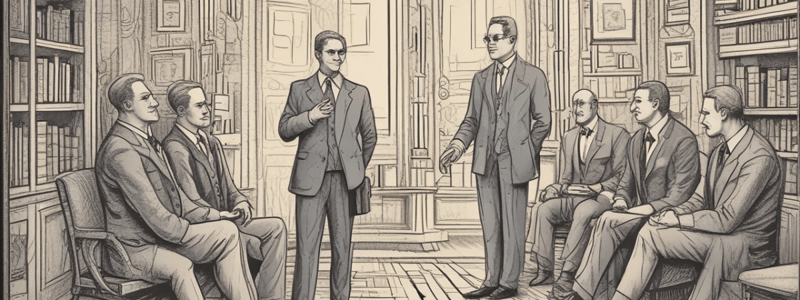Podcast
Questions and Answers
Which of the following principles is NOT a key component of trustworthiness?
Which of the following principles is NOT a key component of trustworthiness?
- Honesty
- Competence
- Transparency
- Assertiveness (correct)
What is the primary purpose of role modeling in a professional setting?
What is the primary purpose of role modeling in a professional setting?
- To manage stress
- To influence coworkers' behavior (correct)
- To balance work and life
- To demonstrate expertise
What is the primary consideration for teachers and school staff when making decisions?
What is the primary consideration for teachers and school staff when making decisions?
- The school's policy and regulations
- The welfare of the students (correct)
- The opinions of other teachers and school staff
- Their personal feelings and preferences
What does objectivity in decision-making involve?
What does objectivity in decision-making involve?
Which of the following is a practical step to cultivate and enhance trustworthiness in a professional setting?
Which of the following is a practical step to cultivate and enhance trustworthiness in a professional setting?
What is the primary goal of applying ethical decision-making in a professional setting?
What is the primary goal of applying ethical decision-making in a professional setting?
What is the purpose of explaining one's decisions to students and parents?
What is the purpose of explaining one's decisions to students and parents?
What should teachers and school staff do when they make a mistake?
What should teachers and school staff do when they make a mistake?
What is the significance of transparency in building trustworthiness?
What is the significance of transparency in building trustworthiness?
Which of the following is a characteristic of reliability in a professional setting?
Which of the following is a characteristic of reliability in a professional setting?
What is the benefit of writing down important decisions and why they were made?
What is the benefit of writing down important decisions and why they were made?
Why is it important to consider how a decision will affect the students and others involved?
Why is it important to consider how a decision will affect the students and others involved?
What is the primary benefit of being a role model in a professional setting?
What is the primary benefit of being a role model in a professional setting?
Which of the following is NOT a component of trustworthiness discussed in the content?
Which of the following is NOT a component of trustworthiness discussed in the content?
What is the result of making fair and ethical decisions in the school?
What is the result of making fair and ethical decisions in the school?
What is the purpose of getting different viewpoints before making a decision?
What is the purpose of getting different viewpoints before making a decision?
What is the primary purpose of maintaining confidentiality in a professional setting?
What is the primary purpose of maintaining confidentiality in a professional setting?
Which of the following is a key aspect of applying ethical decision-making in a professional setting?
Which of the following is a key aspect of applying ethical decision-making in a professional setting?
Study Notes
Trustworthiness
- Honesty is the foundation of trustworthiness, involving truthfulness in all professional interactions, admitting mistakes, and avoiding misleading information.
- Reliability is crucial, involving consistent meeting of deadlines, keeping promises, and maintaining a standard of work that others can depend on.
- Transparency plays a significant role in fostering open communication and sharing necessary information, helping to avoid misunderstandings and build a supportive dialogue.
- Maintaining confidentiality is paramount, protecting sensitive information and respecting privacy, assuring stakeholders that their data is safe and handled with care.
- Fairness involves treating all individuals and parties with respect and impartiality, ensuring decisions are made without bias, contributing to a trustworthy environment.
- Competence possessing the necessary skills and knowledge for one's duties ensures a professional can effectively handle responsibilities, reinforcing trust.
- Adhering to ethical behavior and industry standards reassures everyone of a professional's integrity.
Role Modeling
- Role modeling is important in professionalism, especially when influencing co-workers.
- Role modeling involves being ethical, always doing what is right even when it's hard.
- It involves staying professional, being on time, being ready to work, dressing properly, and acting politely.
- Good work habits, such as communicating well, working well with others, and solving problems, help set a good example for everyone around them.
- Learning and growing, helping others, and handling stress well are also key aspects of role modeling.
- Balancing work and life is important, showing that you value this balance and respect your own time and health.
Ethical Decision-Making
- Ethical decision-making involves making good, fair, and honest choices, especially when handling situations at school.
- Upholding student welfare is crucial, considering what is best for students first and prioritizing their needs and well-being.
- Objectivity in decision-making ensures fairness and avoids personal feelings or preferences influencing choices.
- Transparency and accountability involve being clear and open about decision-making, explaining choices, and being responsible for them.
Studying That Suits You
Use AI to generate personalized quizzes and flashcards to suit your learning preferences.
Description
This quiz covers the essential principles of trustworthiness in professionalism, including honesty, reliability, and maintaining professional relationships. Test your knowledge of the key elements that build and sustain strong professional connections.





